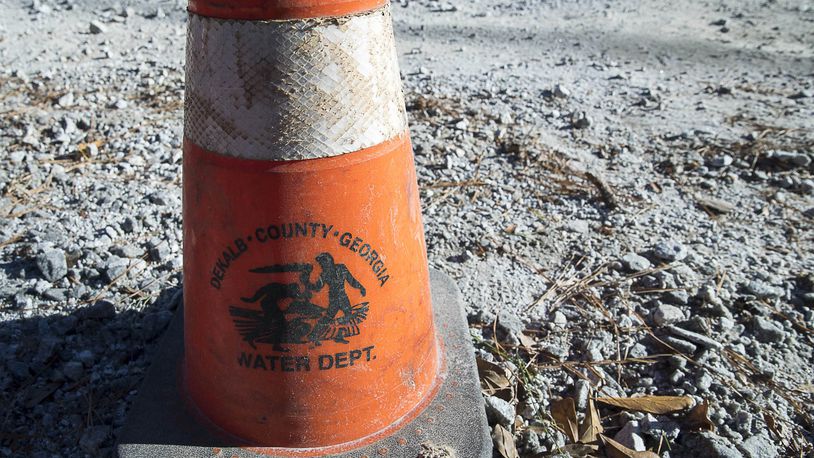
A DeKalb County Department of Watershed Management traffic cone is placed along the construction site where a water issue caused a brief outage on Mt. Olive Drive in Decatur on Jan. 11, 2019. (ALYSSA POINTER/[email protected])
By Tyler Estep
The 6% increase, the first in several years, will go into effect in August
Come Aug. 1, DeKalb County residents’ water and sewer bills will be a little higher.
The county commission voted Tuesday to approve the 6% rate hike, which officials say is necessary to help cover the cost of more than $2 billion in improvements to DeKalb’s historically neglected water and sewer infrastructure.
The increase — which will manifest itself as an additional $6 to $8 on the average bill — is believed to be the first imposed by the county in at least seven years.
“There’s been a lot of due diligence done to get us to this point,” said Commissioner Lorraine Cochran-Johnson, chair of the board’s public works and infrastructure committee. “And I’m very proud to say that we’ve done everything we can, internally, to ensure the proper and smooth operation of our watershed department.”
DeKalb County CEO Michael Thurmond has heretofore declined to suggest raising rates during his tenure, saying he wouldn’t do so until service was improved. But the county now deems its longtime water meter and billing issues to be resolved; the years-long moratorium on disconnecting water service for unpaid bills was lifted in September.
An updated agreement with environmental regulators to address the spill-plagued sewer system was adopted the same month.
The latter comes with a mandate to spend more than a $1 billion in sewer repairs. And Thurmond has said the county is “facing a major crisis” if it doesn’t give the water system a similar amount of attention.
To start addressing such repairs, DeKalb has already accepted one federal Water and Infrastructure Innovation Act (WIFIA) loan for $265 million. A second WIFIA loan worth up to $285 million was discussed during Tuesday’s commission meeting and could be approved in coming weeks.
The money to cover debt service on those loans and pay for other projects has to come from somewhere, officials said, and laying it at the feet of ratepayers was the last remaining option.
“This is a time to be bold and to move, not to second guess ourselves,” Commission Mereda Davis Johnson said. “Because we know the problems that not only exist today but existed yesterday, and last year, and the year before that.”
Tuesday’s 6-1 vote in favor of the rate hike came only after a lengthy, sometimes acrimonious discussion.
Cochran-Johnson made the initial motion to approve but rescinded it after Commissioner Larry Johnson — who would eventually be the lone no vote — expressed concerns about the impact on residents already battling inflation and rising prices in other areas of their life.
Cochran-Johnson suggested sending the matter back to committee to try and build more consensus. But after other commissioners and members of Thurmond’s administration pushed back on delaying the vote any longer, Davis Johnson made her own motion to move forward.
Cochran-Johnson originally voted no, but later said she was confused about which motion was being discussed and had her vote changed.
In terms of helping low-income residents with increasing bills, county COO Zach Williams said the item adopted Tuesday mandated “the establishment of a customer assistance program to defray the cost of service for income-eligible customers.” Few other details were provided, but Williams said the program would be in place before new rates start in August.
The commission also approved Tuesday a separate program that would dedicate $5 million toward helping low-income families pay for plumbing and sewer repairs. Leaks and similar issues drive up residents’ bills but can also be expensive to rectify.
Federal American Rescue Plan funds and other grant money will be used to pay for that program, which will be managed by the Nehemiah Project Community Development Corporation. Officials said the Nehemiah Project has worked on a similar initiative with the city of Atlanta.
Also on Tuesday, District 1 Commissioner Robert Patrick announced a new partnership with St. Vincent De Paul to help constituents with water bills. More information can be found here.
Other commissioners have previously dedicated funding to similar efforts.
Ted Terry, who represents the western half of the county, said rate increases are tough but necessary to improve the water and sewer systems, which have been disproportionately neglected in predominantly Black areas of DeKalb.
“It really will pave the way for tremendous growth and opportunity for, I think, every corner of the county, but most in particularly the parts of the county that have been underserved,” Terry said.
Read the original story on AJC.com.











